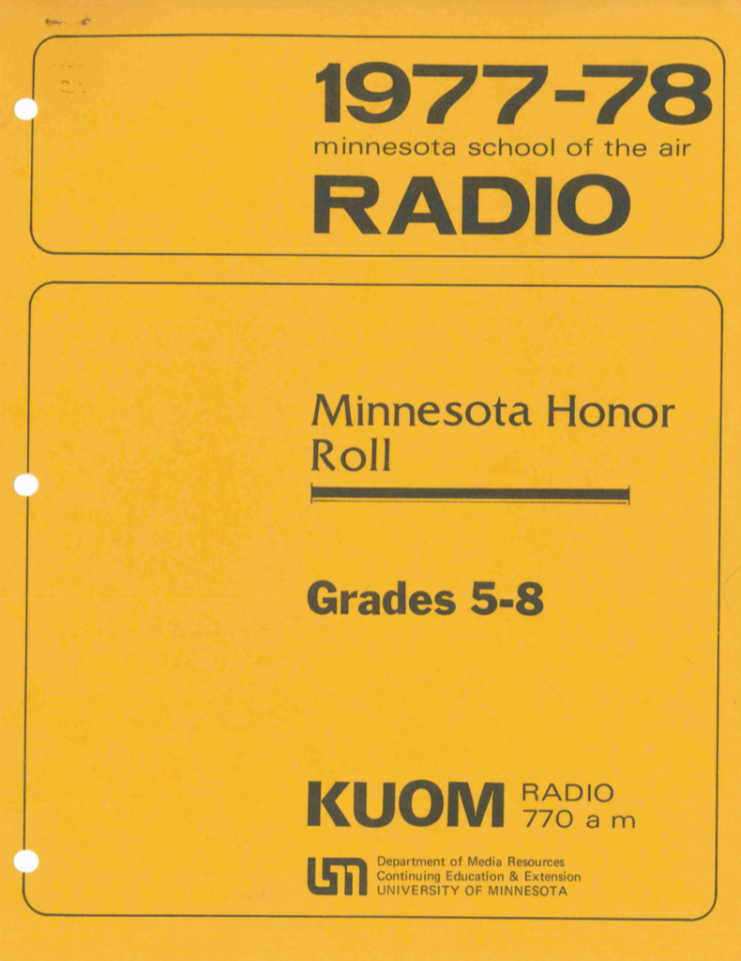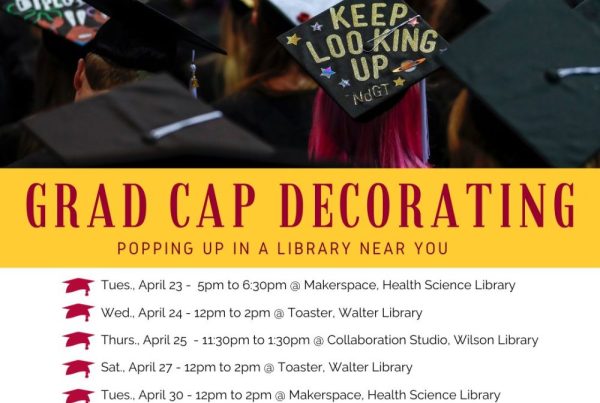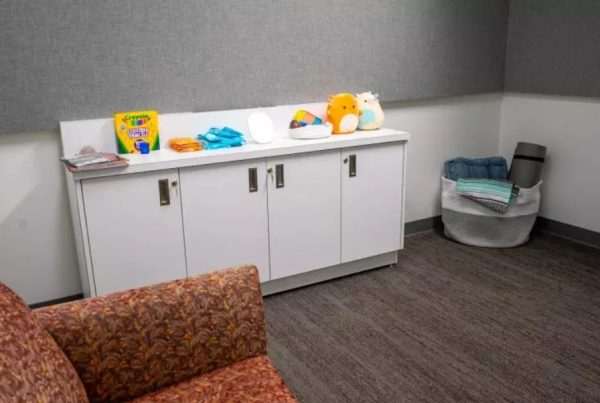You are listening to U of M Radio on your Historic Dial!
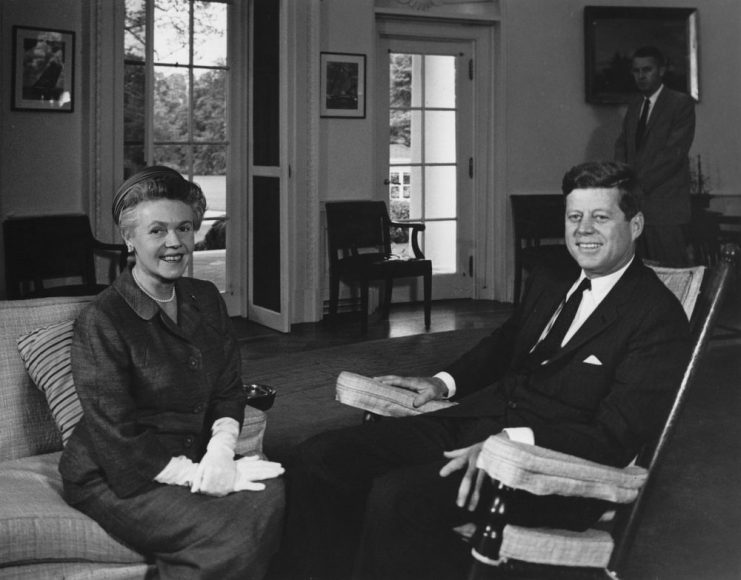
President John F. Kennedy meets with newly-appointed United States Minister to Bulgaria, Eugenie M. Anderson in May 1962. Image ID: AR7272-A, image is in Public Domain. Original is available at https://www.jfklibrary.org/Asset-Viewer/Archives/JFKWHP-AR7272-A.aspx.
Season 3: Episode 1. Women on the Air: Eugenie Anderson
Podcast (umnradio): Play in new window | Download
You are listening to U of M Radio on Your Historic Dial podcast. Welcome to Season 3: Episode 1.
Hello again, this is Rebecca Toov, Collections Archivist at the University of Minnesota Archives. This season, the podcast will follow the theme of the long-standing Libraries program, First Fridays. Every First Friday of the month from October to May at 12:00 p.m. staff from Archives and Special Collections present archival materials from the collections at Elmer L. Andersen Library.
The program theme for this year is: We Are Here: Women in the Archives. The description states, “With women comprising half the population, their accomplishments and voices are found throughout the archives. Yet do their stories regularly rise to the top? The 2018-2019 First Fridays season will focus on female-identifying stories – the firsts, the unsung, the leaders, the marginalized, those who found their way to a place at the table and those who may never have managed to get there.”
For the 3rd season of U of M Radio on Your Historic Dial Podcast, we will present to you “Women on the Air,” a supplement to the First Fridays program. Episodes will feature radio dramatizations and interviews with and about women in University and Minnesota history. We will also share broadcasts on such topics as equal rights and continuing education for women. The voices of the female performers, producers, and program directors at University radio station KUOM will also be heard.
Our first episode features a woman who achieved many notable firsts, a political leader who used her voice to better her community, implement and sustain diplomacy, and develop her own potentiality: Eugenie Anderson, the first woman to be named a United States Ambassador.
A profile of Eugenie’s personal and professional life was featured on KUOM on “Minnesota Honor Roll,” a program of The Minnesota School of the Air – a series of educational radio programs designed for school-age children to listen to in the classroom. Eugenie’s profile originally aired on February 24, 1978. Let’s listen…
Broadcast Transcript
[Band music]
Introduction: Sinclair Lewis, author, Charles Lindbergh, aviator, The Mayo Brothers, physicians, Lew Ayres, actor, Eugenie Anderson, United States ambassador… [voice fades, music plays up]
Announcer: Minnesota Honor Roll: stories from the lives of Minnesota’s outstanding men and women. Here is our story for today about United States ambassador, Mrs. Eugenie Anderson.
[Orchestral music]
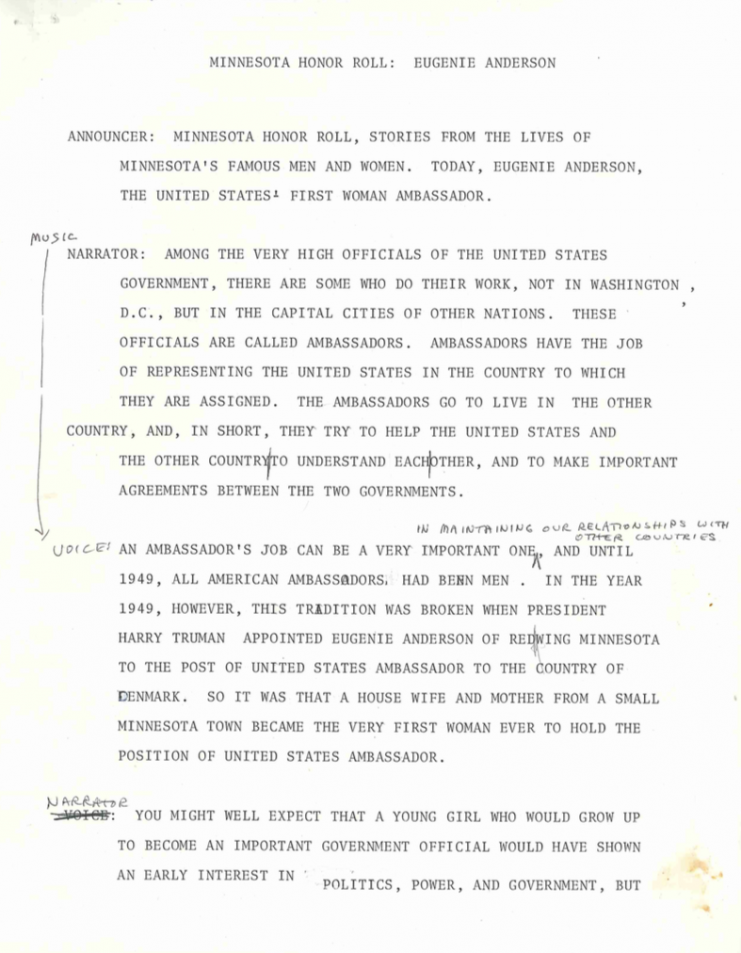
KUOM’s Minnesota School of the Air “Minnesota Honor Roll” transcript page for radio program on Eugenie Anderson.
Narrator: Among the very high officials of the United States government, there are some who do their work not in Washington D.C., but in the capital cities of other nations. These officials are called ambassadors. Ambassadors have the job of representing the United States in the country to which they are assigned. The ambassadors go to live in the other country, and, in short, they try to help the United States and the other country to understand each other, and to make important agreements between two governments.
An ambassador’s job can be a very important one in maintaining our relationships with other countries. And until 1949, all American ambassadors had been men. In the year 1949, however, this tradition was broken when President Harry Truman appointed Eugenie Anderson of Red Wing, Minnesota to the post of United States ambassador to the country of Denmark. So it was that a housewife and mother from a small Minnesota town became the first woman ever to hold the position of United States ambassador.
You might well expect that a young girl who would grow up to become an important government official would have shown an early interest in politics, power, and government, but this certainly was not the case with the young Eugenie.
[Bach piano music]
Mother: Eugenie, dear,
Eugenie: Oh mother, you startled me.
Mother: I don’t like to rush you, but you’ve already been practicing for two hours this afternoon. Don’t forget your other chores, dear. It’ll soon be time for dinner.
Eugenie: Yes mother, thank you for reminding me.
Mother: That’s quite all right dear. And by the way, your playing sounds wonderful!
Eugenie: Thank you!
[Piano music]
Narrator: It’s been said that Eugenie Anderson had the talents of a diplomat, even when she was in pigtails, but her thoughts were of philosophy, and art, and most of all, music.
From the time Eugenie Anderson was a little girl, she played the piano. She loved music and wanted to become a concert pianist. The music of the classical piano led her interests all through her college years. She even attended the famed Juilliard School of Music. Eugenie wasn’t active at all in governments or politics. She never dreamed of being an ambassador, or anybody in the offices of government. Until 1930, it was music that held her heart.
In 1930, Eugenie married John Anderson, also an artist, a painter, and photographer. Together, they made their home in Red Wing, Minnesota. The Anderson’s house was filled with artwork and music. Two children, a daughter Johanna, and a son, Hans, were born. Though Eugenie’s interest in music was to continue all through her life, she had now become a housewife, and mother as well. And the family life of the Andersons was a happy one. But, in the next few years, something was to change Eugenie’s life dramatically…. The rise of the German Dictator, Adolph Hitler.
[Music, marching]
While on a trip to Europe in 1937, Eugenie saw German children dressed in uniforms and marching as soldiers. She thought of her own children, she was shocked and horrified by the thought of five-year-olds acting as soldiers. During World War II, Hitler’s destruction of people, art and freedom, caused Eugenie to question whether her children would be allowed to live in a world at peace. It was this questioning that led Eugenie into politics. She began in small, but very important ways to improve the world for her children. In Red Wing, she joined the League of Women Voters, and soon she started a school lunch program, and a day care program for the school children of Red Wing. Soon, Eugenie became active in political campaigns, making many trips from Red Wing to the Twin Cities. She supported and worked with Hubert Humphrey, and later with John F. Kennedy. She was gifted not only with musical ability, but with an understanding of all kinds of people, and a great talent for warm, personal communication. She was a brilliant public speaker and was able to speak without a written text. Eugenie proved to be such an able campaigner and worked so well with all kinds of people, that the highest political officials were deeply impressed. Though she had been involved in politics for only five years, and had not held an office, she seemed a natural choice for a diplomatic post. So it was, that in 1949, President Truman surprised her with the appointment as ambassador to Denmark.
Because Eugenie was the first woman to hold the post of ambassador, some of the Danish people were skeptical before she arrived.
Dane: Yah, so now the United States is sending a woman to Copenhagen. Sure, it’s a fine idea for publicity, I only hope she can do the job.
Narrator: Nevertheless, the Danes welcomed Eugenie with great cordiality. She found that the house she was to live in had been completely redecorated before her arrival, and she felt that this called for a celebration. She decided to give a party; but for the highest dignitaries and government officials in Denmark? No indeed, the first party Ambassador Anderson was to give in Denmark was for the more than 80 workmen who decorated the house. This gesture warmed the hearts of the Danish people, and of the Prime Minister, who sent a bouquet of roses to Eugenie on the following morning. Eugenie Anderson proved herself to be genuinely interested not just in government, but in the people and culture of Denmark. She learned the Danish language and continued to study it as long as she served as ambassador. The children, Hans and Johanna, attended Danish schools. Eugenie traveled all over Denmark, speaking with people, not only of politics, but of philosophy, art, music, and all other subjects. The combination of dignity, familiarity, and common sense that Eugenie brought to the job, made her term as ambassador to Denmark a very great success. In recognition of the Danes’ esteem for her, King Frederick IX, awarded Eugenie the Grand Cross of the Order of Dannebrog, still another first for a woman.
Eugenie left Denmark in 1953, but continued her interest in politics and diplomacy. She campaigned for John Kennedy, Hubert Humphrey, and Lyndon Johnson. She served as a diplomat in Bulgaria, and in the 1960s she visited Vietnam.
Throughout her diplomatic career, Eugenie found music and art to be a valuable way of communicating with people all over the world. She often entertained her guests by playing the piano, and she arranged many kinds of official cultural exchanges. She has said that a women’s special skill is in human relations. Her ability to communicate so well, with so many people, has made Eugenie Anderson, “The pride of Red Wing,” an outstanding world diplomat.”
[Music]
You’ve just heard another of the many stories of our state’s outstanding men and women on Minnesota Honor Roll. These programs are written by Dean and Caren Johnson and have been produced by Walter Brody for the Minnesota School of the Air.
[Music concludes]
Minnesota Honor Roll
Programs that aired under the Minnesota School of the Air series were accompanied by printed teacher’s handbooks that were provided to educators before the school year. The handbook included a section for each episode that provided a brief synopsis and offered questions to facilitate classroom discussion about the broadcast. In the handbook for the Eugenie Anderson episode, one of the questions was, “Why haven’t there been more women ambassadors?” This was followed by the blunt question, “Is there something wrong with women?”
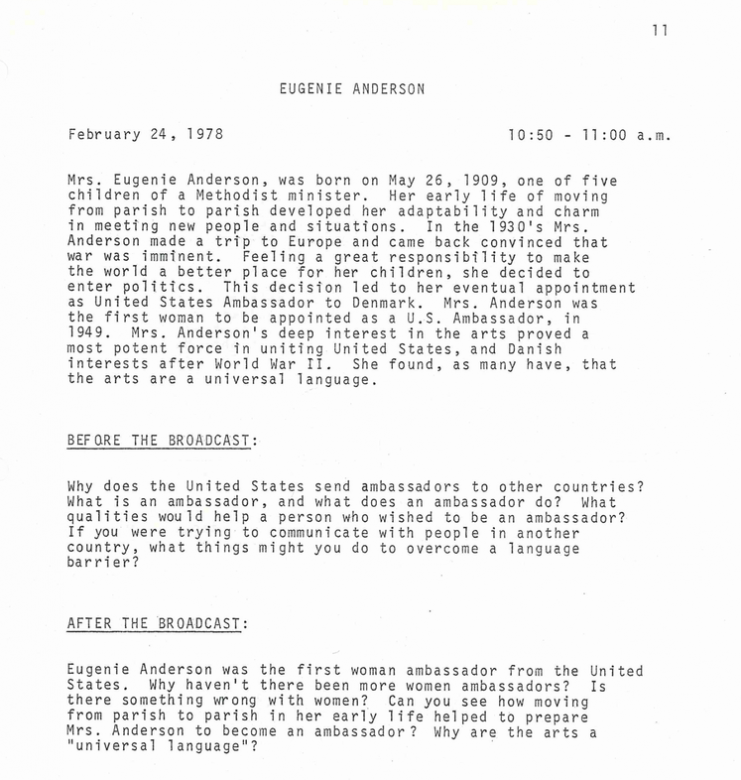
KUOM’s Minnesota School of the Air “Minnesota Honor Roll” program teacher handbook curriculum about Eugenie Anderson. After the broadcast, teachers are to ask, “Why haven’t there been more women ambassadors? Is there something wrong with women?”
The Minnesota Honor Roll program celebrated Eugenie’s accomplishments and her contributions to community and country. Yet, the inclusion of the Danish character who insinuated that Eugenie’s appointment was for publicity, highlighted the skepticism that Eugenie faced as a female political leader in the mid-20th century.
After President Truman announced Eugenie as the ambassador to Denmark in October of 1949, the Minneapolis Tribune published an article on October 16 titled, “America’s First Madam Ambassador: From Red Wing… to Copenhagen.” It appeared on page 49, in the Women’s News, Books, Music, and Travel section. The article reported that following her appointment, Eugenie faced confirmation by the Senate, and completion of a state department briefing. But that wasn’t all…
Quote, “Another thing Mrs. Anderson will have to do before her departure is get together an ambassador’s wardrobe, which is rather different from her present wardrobe, geared to the needs of a housewife, mother, and part-time politician.
She has always liked tailored skirts and jackets and will go to Copenhagen with a half dozen new suits by… her favorite designer. She’s also adding some evening gowns to her rather limited supply,” end quote.
Rather than remind readers of Eugenie’s accomplishments, the article described her home in Red Wing, and name-dropped all of the men in her life. Her home, named Tower View, was next to the “great big house” and laboratory where Eugenie’s father-in-law, Alexander Andersen lived and worked. Readers were reminded of the “huge fortune” that Alexander amassed as the inventor of puffed cereal.
The article described Eugenie’s living room, which was adorned with seven abstract artworks by her brother-in-law and local artist Charles Biederman. Her husband, John Pierce Anderson, also an artist, was described as “tall, lean… with longish auburn hair,” who “gave quiet approval to his wife’s new job.”
The article concluded by offering reassurance to readers that a woman ambassador could potentially be successful in Denmark:
Quote, “While people here may be surprised that a woman has now invaded [emphasis added] the field of ambassadors, it won’t seem so strange to the Danes,” end quote.
The article continued by citing examples of women who had invaded other predominantly male fields in Denmark. The country had women ministers, cabinet members, United Nations delegates, and judges.
The Tribune article, published days after Eugenie’s appointment in 1949, provided an in-the-moment reaction to what was, at the time, perceived as a novelty. A woman, the first in the history of the United States, would represent the country abroad as an ambassador. The Minnesota Honor Roll recording, which aired in 1978, nearly 30 years after Eugenie was appointed ambassador, provided a reflective perspective on Eugenie’s accomplishments as a politician and diplomat. There was no emphasis on her wardrobe or mention of her well-known male relatives. After her husband was briefly introduced in the narrative, the sentence that followed stated, “Together [emphasis added], they made their home in Red Wing, Minnesota.”
Now that we’ve heard from other sources about Eugenie Anderson, let’s hear from Eugenie in her own words. On another Minnesota School of the Air program, “Memorable Minnesotans,” which originally aired on November 4, 1971, Eugenie was interviewed by KUOM producer Marvin Granger. Granger asked Eu genie how children (the primary audience of the broadcast) could contribute to our democracy, and how changes can be made to the political system. Granger also asked, “What kind of role can women play in our public life and how do they go about it?” Let’s listen to what Eugenie had to say…
Broadcast Transcript
Granger: Mrs. Anderson, life today is so hurried, so complex, that it is difficult for adults to realize that as individuals they are very important in the life of a democracy. It must be even more difficult and more frustrating for a young boy or girl to learn that each person plays a very important part in the running of our nation. How can children find out or learn how to be contributing members to our democracy?
Anderson: I believe so strongly that every individual is different from every other individual… and one of the great things, one of the best things about a democratic society is that every individual has the opportunity to develop his own potentialities and I believe that if an individual, a child, or growing up person tries to learn about himself and not only what he can do best, but what he can do best for others and with others, that gradually he will discover what role, what meaningful role he can play in the community. People, children, may aspire to great national roles, to heroic roles, but I think that almost everyone must start out in their own community. And for a child, this means starting out in his school, in his classroom, with his playmates, and with his friends. And gradually, I think that people will find out what interests them the most, people do best what interests them the most. And in this way, they discover what contribution they can make to others. And I think that most people in a democracy feel that their greatest satisfaction comes from working with other people to try to solve our common needs and problems. This is something that is a process of growth, that has to come from inside the individual, but of course, it needs lots of help from teachers and friends, family… it’s a very complicated but a wonderful process.
Granger: Many adults, and I think many children also grow up with the notion that there is something wrong, something crooked about politics. And yet, Mrs. Anderson, you have spent much of your life in politics. How would you defend, or perhaps explain is a better term… How would you explain politics to young people?
Anderson: Well, of course, there is something wrong with politics. But one reason why everybody in a democracy should work at politics is to right the wrongs and to change the things that are wrong and to make politics an honorable profession, which it is in many countries and I think in our country on the whole. We recognize that there is a lot wrong with the system. There is a lot to be desired in the behavior of some political leaders, but still, we have the possibility… this again I would say is one of the great things about living in a democracy is that we can change our political system, we can improve it, we can right the wrongs, we can make it clean… This is one of the reasons why I believe so strongly that women should go into politics, once again in their own communities they should do this, because women, in general, I think, want a better community, want a clean and honest politics, and honest officials.
Granger: Could we talk for just a moment about women in public life? What kind of role can women play in our public life and how do they go about it? More women are in public life in this country today than ever before. Why?
Anderson: Well actually this is the situation that has been evolving now. I think when I was a girl, women were not playing a very active role in public life, but today in most countries, especially most Western countries, and I must say this is true in Africa too and some of the countries of Asia and India for example, women play a very great public role. But, more and more, we in the United States, women, not only have the opportunity of participating on an equal basis in public life, and this means political and professional life, diplomatic careers, but I think women have the responsibility to do this because actually, we all can see quite clearly that our children are going to grow up in a certain community. And if we want to have our children’s lives to be productive and happy and full of opportunity, develop as they wish to do, then we have to interest ourselves in their communities. This is actually how I first went into public life. I didn’t start out as an ambassador, I started out trying to establish a school lunch program for the school where my children were going to school. There wasn’t any, and I thought there should be one. And so I started working with other people to try to establish a school lunch program. This worked out… then I became interested in the whole school and after a few years I ran for the school board, served on the school board. And I think that this is how many women go into community responsibility and political and public life, to relate themselves to their own community and to the lives of their own children, to do the things that are going to influence their children’s future. And gradually this leads one into national affairs, and it can lead one into international affairs because after all, the problems of peace and war are absolutely fundamental to all of us.
Eugenie Anderson embraced the opportunity to develop her own potentiality. She learned about herself, what she could do best, and what she could do best for others. Eugenie discovered the meaningful role that she could play within her community and proved that women could – and should – play a meaningful role within their country.
This has been Season 3: Episode 1 of “Women on the Air” featuring the memorable Minnesota woman, Eugenie Anderson. To learn more about Eugenie, review her personal papers, which are preserved at the Minnesota Historical Society.
Join us at Elmer L. Andersen Library for the inaugural First Fridays program of the season on October 5, 2018 at 12:00 p.m. presented by Kathryn Hujda, Assistant Curator of the Upper Midwest Literary Archives, and Tim Johnson, Curator, of Special Collections and Rare Books.
Be sure to arrive early to enjoy light refreshments prior to the program. If you haven’t seen Andersen’s underground storage caverns stay for a tour after the presentations conclude at 1:00 p.m. The full First Fridays schedule and detailed descriptions of upcoming presentations can be found at the website z.umn.edu/ff18.
About this podcast
The U of M Radio on Your Historic Dial podcast is produced by University Archives for your enjoyment. Subscribe or download on iTunes or GooglePlay so you don’t miss another moment of historic Minnesota radio.
Recordings of the program series Look What We Found were digitized in 2016 in part with funds provided by the State of Minnesota from the Arts and Cultural Heritage Fund through the Minnesota Historical Society.
—Rebecca Toov is the collections archivist for the University of Minnesota Archives.


